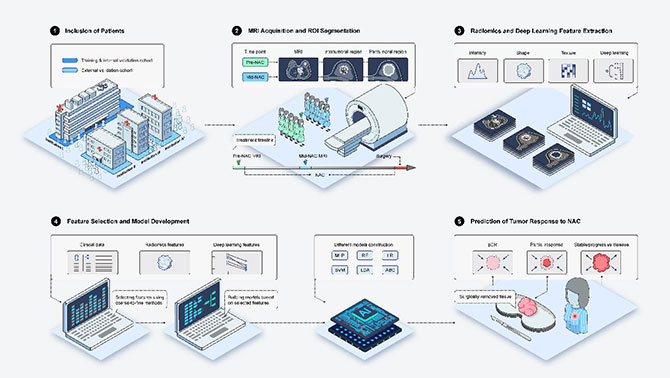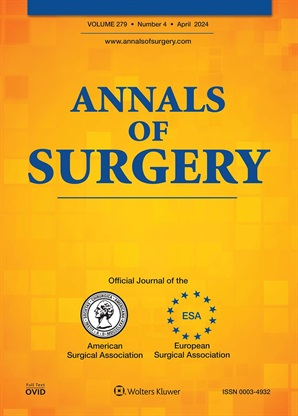

Recently, the latest research achievement titled “Noninvasive Artificial Intelligence System for Early Predicting Residual Cancer Burden during Neoadjuvant Chemotherapy in Breast Cancer” led by Prof. Wang Kun from the Department of Breast Cancer, in collaboration with the First People’s Hospital of Foshan, the First Affiliated Hospital, Sun Yat-sen University, and Shantou Central Hospital, has been published in the top-tier surgical journal “Annals of Surgery” (SCI Q1 top, impact factor: 10.1). This achievement, marks another significant milestone following their previous research contributions such as “Quantitative Assessment of Pathological Complete Response in Breast Cancer Utilizing Radiomics Intelligence” (published in eClinicalMedicine in March 2023) and “Multi-factor Intelligent Model for Accurate Prediction of Axillary Lymph Node Status after Neoadjuvant Chemotherapy in Breast Cancer” (published in the International Journal of Surgery in October 2023), once again showcasing Chinese wisdom to the world.
Breast cancer ranks among the most prevalent malignant tumors in women globally, and neoadjuvant chemotherapy stands as the standard treatment for locally advanced breast cancer, aiming to reduce tumor size and optimize subsequent surgeries. For patients undergoing neoadjuvant chemotherapy, residual cancer burden (RCB) grading based on parameters such as the extent of the primary tumor, cancer cell density, number of positive lymph nodes, and maximum diameter of lymph node tumors can assess treatment response, with lower RCB grades indicating better outcomes. Identification of RCB-III patients early in neoadjuvant chemotherapy is crucial for clinical decision-making, allowing timely adjustments to chemotherapy regimens and tailored surgical and follow-up strategies. However, there is currently a lack of non-invasive tools in clinical practice for early assessment of RCB grading. To address this gap, Prof. Wang’ team developed an artificial intelligence system based on multi-time-point MRI, aiming to accurately predict RCB grading in breast cancer early during neoadjuvant chemotherapy.

Taking MRI as a starting point, Prof. Wang’s team utilized MRI data from breast cancer patients across multiple centers to construct an artificial intelligence system tailored to different molecular subtypes of breast cancer, capable of accurately predicting RCB grading in the early stages of neoadjuvant chemotherapy. This AI system, a pioneering effort internationally, leverages multi-time-point MRI images and demonstrated outstanding predictive performance through rigorous multi-center validation. Moreover, while most existing clinical models can only predict whether breast cancer can achieve pathological complete response, the AI system developed by Prof. Wang’s team successfully overcomes the limitations of existing models, not only accurately predicting favorable outcomes for RCB 0-I patients but also early identifying chemotherapy-resistant RCB-III patients. This breakthrough assists physicians in adjusting neoadjuvant chemotherapy regimens and determining optimal timing for surgery and also promotes precision in breast cancer treatment, offering more personalized surgical and care management for patients while minimizing the toxic side effects of chemotherapy and reducing patients’ economic burden, thereby holding significant value in clinical practice.

As an absolute authority in the global surgical community, the “Annals of Surgery” has the highest citation frequency in the global surgical field, witnessing and documenting most of the landmark events in human surgical advancements, only considering publishing research papers that bring breakthrough contributions to the surgical field. The first authors of this research paper are Dr. Li Wei, Dr. Huang Yuhong, and Dr. Zhu Teng from Prof. Wang’s team. This research is another outstanding scientific research achievement supported by the Peak Climbing Program of the Department of Breast Cancer.
The Department of Breast Cancer of Guangdong Provincial People’s Hospital consistently responds to the spirit of the comprehensive development of medical, teaching, and research in the Hospital. With strong support from hospital policies, the Department has continuously achieved excellent results in research and clinical work. Prof. Wang’s team, based on clinical practice, has conducted a series of basic, translational, and clinical studies in breast cancer treatment. Since 2019, his team has obtained 8 National Natural Science Foundation projects, 4 Guangdong Provincial Natural Science Foundation projects, and published 6 high-quality SCI papers with a first author’s impact factor exceeding 10 points and a total impact factor of SCI papers exceeding 100 points. For breast cancer patients undergoing neoadjuvant therapy, the team is committed to improving the efficacy of neoadjuvant therapy for breast cancer patients while also paying attention to potential toxic side effects during treatment and monitoring treatment response in a timely manner, striving to develop the best treatment plan for patients and improve their postoperative quality of life. In the future, Prof. Wang’s team in the Department will stay true to their original aspiration, forge ahead, and strive to practice the goal of building a high-level international hospital. As a compassionate medical team, they will continue to provide the best treatment options for breast cancer patients.
Huang Yuhong, Zhu Teng, Zheng Junqiu
Updated: April 3, 2024